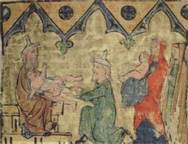Big Idea: The (Distinctively) Christian View of Marriage

So one reason for LIBERAL EDUCATION is to give students some sense of the genealogy of our ideas.
It seems as if everyone believes in free persons these days. Not only that, we tend to believe that the PERSON is the bottom line. Nothing trumps the security and freedom of the persons alive right now. Certainly that’s the TRANSHUMANIST view. But it’s also the view of the atheistic nonfoundationalist, who believes that various forms of foundationalism have gotten persons repressed and killed for no good reason.
In my view, the idea of the free person actually came into the world with Christianity. We find it, for example, in St. Augustine’s denial that the NATURAL and CIVIL theologies of the Greeks and Romans could possibly be true. That’s because each of us is not merely part of nature or part of some political community or city. Each of us has an irreducible personal identity. That’s because each of us is made in the image of the personal and relational God.
It seems to me that you wouldn’t necessarily have to believe in the personal God of the Bible to affirm irreducible personal identity. Consider, for example, these comments I made at a recent conference about the distinctively Christian contributions to our understanding of marriage:
The Christian view of marriage and the family doesn’t negate the merely natural and political purposes of marriage. Marriage is for propagation of the species—a natural function that we share with the other animals. Marriage is also for perpetuating political order; it has the civil function of producing citizens. But Christians put this natural good and this political good in their proper places by denying that they have a theological foundation. Serving the species and serving one’s country are not the highest purposes of marriage, and so marriage, and children, too, can’t be understood to exist for the species or the country. We aren’t in fact made in the image of the God as merely natural—in the sense of biological—or political beings.
True theology, as St. Augustine says, is personal—and so not civil or natural. And so the high or sacramental purpose of marriage is for the uniting of persons for the procreation of persons—beings who can know and love each other and God. The institution that corresponds to our personal purposes is the church. That means, of course, the authority of the state is limited by both the family and the church, and the education of children is to be more than for being citizens.
Our biological and political existences—our location in a particular body and in a particular place—are, in fact, part of being personal. The person is—but is more than—a part of nature and a part of his country. A liberated woman is not liberated from either the longing for or the responsibility to have children, but she doesn’t understand that personal responsibility the way a Darwinian or a Spartan would.
With the coming of Christianity, the city could no longer command men and women to have children to replenish the human cannon fodder that had been lost in the last war, as it apparently it even commanded Socrates. And it could no longer be understood to be allowed to treat persons like animals to be bred for improving the species or the city. The objection we have to the eugenics schemes of Socrates in the Republic or those of the 20th century fascists in decisively personal or Christian.
That’s why Christians have dissented from any theology that reduces persons to less than they really are. The early Christians seemed like dangerous atheists to the Romans, and that why even or especially the most philosophic emperors—such as Julian and Marcus Aurelius—were so big on wiping them out before it was too late.
The Christians denied the very existence of the gods of the city, the divine foundation that secured the political community. Their atheism, in fact, seemed more dangerous than that of the philosophers who exempted only themselves—because of their liberated minds—from the commands of the Laws. For the Christian, every person is liberated from the degrading cave that was the ancient city. No person—or not just philosophers—should submit to political domination. We’re all liberated by virtue of who each of us most deeply is.
The Christians are, in fact, political atheists because they know are made in the image of the personal God. They are, above all,members of the City of God that transcends every political distinction by encompassing us all—Jew and gentile, Roman and barbarian, man and woman, black and white, smart and not-so-smart, and so forth.
So Christian marriage is more personal than the civil marriage of the Greeks and Romans. It’s less political or less distorted by arbitrary patriarchal considerations. Every innovation associated with Christian marriage aimed to elevate women to equality with men as free, relational persons, to reflect the truth, which we so readily deny with pride, that we are all equal as sinful persons under God.
The prohibition of divorce—a New Testament innovation—was for women, because divorce was rarely really available for them. The sanctification of monogamy is all about the uniting of two equal persons for shared responsibilities. Monogamy together with chastity were for locating sexual desire in a deeply relational or loving context, and so men could no longer exploit women as mere bodies. Polygamy, found for example, in the Old Testament, was more a political than a relational institution, one that necessarily subordinates women to the will of men.
The Greeks and Romans, of course, were big on distinguishing between the joys of liberated erotic satisfaction and the civil and reproductive necessities that generated the institution of marriage. That distinction, of course, degraded women in many ways, making them instruments for the satisfaction of male erotic and political desire. It also led, in some cases, to the privileging of homoerotic over heterosexual or merely reproductive sex. It was good personal news for women that chastity is a virtue for both men and women equally. It certainly was news to men.





